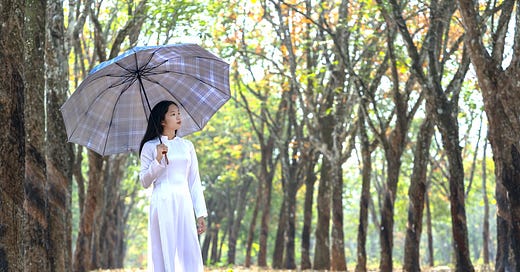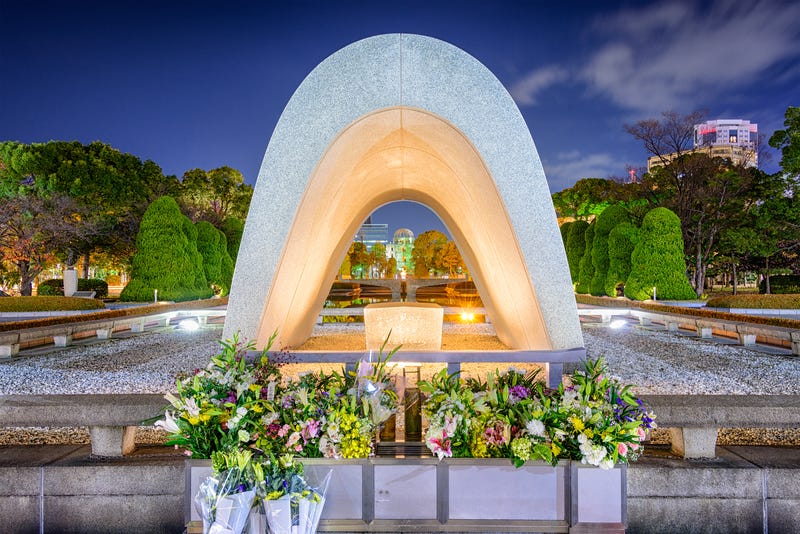It is very nice to have a holiday, but my thoughts have been reeling around the time I spent in Vietnam and the tensions in the world today. Searching through the archives of my psyche, the challenge has been to find the key to peace. Sages will, of course, always insist that we must first find peace within, but does this actually depend on love, on harmony, on respect, or renunciation of the desire to force an outcome? I contributed a great deal to the withdrawal plan for Vietnam, but when I look back, this was about saving face, not about peace. The war had become so unpopular and protracted that it could not be sustained without political loss. It was not about admitting fault or failure, it was about hiding the tail between the legs in the best way possible.
There were endless official visits to Vietnam, and I was, at the age of 24, a hostess for some of these visits, including a delegation from Hawaii, the head of which was a member of the State Legislature and life-long friend. He begged me to leave before my psyche was damaged. I don’t know that the experiences in Vietnam harmed my psyche, at least not permanently. I was always a pacifist and always had a deep inner life; but, of course, we have nerves and some were shattered.
The sages are hence correct about peace arising within, but can this be shared? If I am peaceful, will this make any difference to anyone else? Is peace something we each have to discover one person at a time? On what is my peace based? First, I believe, peace relies on integrity. If one’s motivations are not pure, one cannot be at peace with oneself. Secondly, there should be an absence of self-interest. One cannot want something that belongs to someone else. This implies respect for others even if they seem to be too weak to defend themselves against predators. So, respect is the third attribute that is necessary for the harmony on which lasting peace depends.
On the level of corporatocracy, there cannot be greed for the natural resources or land of another country. It does not matter whether we are talking about destroying the rubber industry of Vietnam or coveting the oil in the Middle East or lithium in Bolivia and Peru or coltan in the Congo, what matters is fairness, including a willingness to take responsibility for the environment and prevent damage to the ecosystems upon which we all depend.
Again, using Vietnam as an example, besides the total waste of human lives, the use of Agent Orange and other toxins — 73 million liters of chemical agents — left a trail of environmental and health hazards that still to this day have consequences. The havoc in Kosovo, in the Gulf War and Afghanistan, and now Ukraine is perhaps even worse because depleted uranium may have consequences for many generations.
The spraying in Vietnam was originally dubbed “Operation Hades” (later renamed), and it affected allied troops as well as Vietnamese people. I probably had some minor exposure when visiting Montagnards in the Highlands with my Vietnamese assistant. In fact, Lily and I must have been divinely protected.
As noted, I was very young back then, but also observant. To the best of knowledge, there was no justifiable reason for the war, certainly no reason for a single person to have died. If there were some concerns, skilled diplomats should have been able to solve the problems, but I did not see any effort going in that direction. For the most part, this would appear to have been the case in later misadventures as well. What, then, was the agenda? I was privy to some highly classified documents so without breaching anything that might still be classified, I can say that nothing I read suggested that the reason for the war in Vietnam had anything at all to do with Vietnam.
Aside from rubber, much of which was destroyed, the only other export from Vietnam at that time was duck feathers. That business was 100% owned by an Australian whom I knew . . . and that might be a story for another time.
Despite many efforts to persuade me to carry a weapon, I always refused. I said clearly that my purpose was not to harm anyone so I did not require a weapon. They kept up the pressure for over a year and half, but never persuaded me. I also went to great pains to say that I was on the side of peace, not war, and felt equal compassion for everyone: the family and friends of those who were fighting, the brainwashed people who thought there was a reason to risk their lives, and those who felt they were defending their country from hostile foreigners. The plans for such enterprises are hatched in the minds of psychopaths, and others are the victims of their agendas.
So, how do have peace. We find it in ourselves and refuse to deviate from our truths. Ultimately, the resistance becomes stronger than the war propaganda. There will always be those who say Gandhi was a one-time event in history, that a man in a loin cloth cannot bring down an empire. He did not bring down an empire. He led a resistance movement that brought down an empire, and this always works.
Those who make peaceful revolution impossible will make violent revolution inevitable.
John F. Kennedy
Copyright by Dr. Ingrid Naiman 2023 || All Rights Reserved
For permission to quote, please contact the author. Sharing via e-mail and posting links are welcome so long as the author and source are properly cited. Reprinting is strictly prohibited.
Image Credits:
Rubber Plantation: Huy Thoai | Dreamstime.com
Hiroshima Peace Park: Sean Pavone | Dreamstime.com





